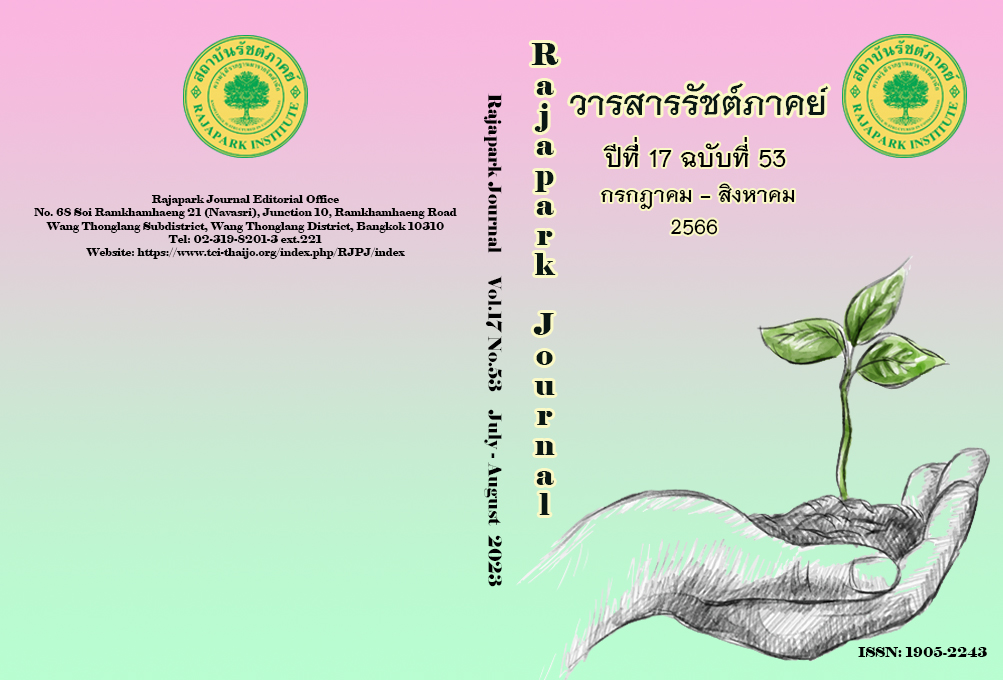Women’s Roles in Terrorism
Main Article Content
Abstract
The objectives of this research article are to study the motivations roles and processes of women’s involvement in terrorism, including seeking proper prevention and other relevant measures. This study is qualitative research based on documents and various media. At the same time, the theories of criminology, social science, and political science are used as a guiding framework for the study. The research results found that terrorism by women is another form that has been used by foreign terrorist groups. However, they are not properly aware or monitored. Women in southern border provinces of Thailand have also involved with the insurgent group. They have been recruited, mostly by family members, using political religious and personal issues as factors to stimulate them to join the group. Women’s roles in the insurgent group are first aid, transportation, revenue, and information gathering, which help drive violence in terrorism. Therefore, recommendations in this study are to increase preventing measures on women in terrorism and applying criminology theories in the process of making relevant policy.
Article Details

This work is licensed under a Creative Commons Attribution-NonCommercial-NoDerivatives 4.0 International License.
Views and opinions appearing in the Journal it is the responsibility of the author of the article, and does not constitute the view and responsibility of the editorial team.
References
Amornrattananuparp, P. (2020). Revolution in Military Affairs: Handling with Cyber Terrorism. http://opsd.mod.go.th/Knowledge/File/joinPdf_bc109bf20df3812d28dd236e270988ae.aspx
Anti-Money Laundering Office. (2022). Thailand Designate List. https://www.amlo.go.th/dpl/content/index/9
Baboe, K., & Rajab, K. (2016). Socio-Psychological Record of Southern Thailand Women: A study on political conflict 1903-2014 of Southern Thailand. Shariah Journal, 24(1), 137-156.
Bayar, Z. (2019). The Role of Women in Terrorism[Unpublished Master’s thesis, University of New York]. https://academicworks.cuny.edu/cgi/viewcontent.cgi?article=4346&context=gc_etds
Bigio, J., & Vogenstein, R.B. (2019). Women and Terrorism Hidden Threats, Forgotten Partners. Council on Foreign Relations. https://www.cfr.org/report/women-and-terrorism
Bloom, M. (2011). Bombshell: Woman and Terrorism. University of Pennsylvania Press.
CNN. (2022). Germany Arrests 25 Suspected Far-right Extremists for Plotting to Overthrow Government. https://edition.cnn.com/2022/12/07/europe/germany-far-right-arrests-grm-intl/index.html
Helbardt, S. (2011). Deciphering Southern Thailand’s violence: Organization and Insurgent Practice of BRN-Coordinate[Unpublished Doctoral dissertation, University of Passau].
Hoffman, B. (2017) Inside Terrorism. Columbia University Press.
Hughbank, R.J., & Hughbank, D.L. (2007). Application of the Social Learning Theory to Domestic Terrorist Recruitment. https://www.ojp.gov/ncjrs/virtual-library/abstracts/application-social-learning-theory-domestic-terrorist-recruitment.
Human Right Watch. (2020). Covid-19 Fueling Anti-Asian Racism and Xenophobia Worldwide. https://www.hrw.org/news/2020/05/12/covid-19-fueling-anti-asian-racism-and-xenophobia-worldwide
Isranews. (2017) Should BRN be a Terrorist Organization?. https://isranews.org/south-news/documentary/56177-barisan-56177.html
King, M., & Taylor, D.M. (2011) The Radicalization of Homegrown Jihadists: A Review of Theoretical Models and Social Psychological Evidence. Terrorism and Political Violence, 23(4), 602-622. DOI:10.1080/09546553.2011.587064
Nasir, A. A. (2019). Women in Terrorism: Evolution from Jemaah Islamiyah to Islamic State in Indonesia and Malaysia. Counter Terrorist Trends and Analyses, 11(2). www.jstor.org/stable/26627977.
National Intelligence Agency. (2023). Etidal cooperate with Telegram to get rid of violent and extremism content especially by terrorist groups. https://www.nia.go.th/news/page/3284/
Noakes, L. (2014). Listening to Terrorists: Investigating the Motivations of Female Political Extremists through Their Own Words[Unpublished Master’s thesis, University of London].
Olbrycht, P., & Serwata, K. (2020). Women in Fundamentalist Terrorist Organisations as a Threat to Security. Historia i Polityka, 34(41), 159-173. DOI:10.12775/HiP.2020.041
Patel, S., & Westermann, J. (2018). Women and Islamic-State Terrorism: An Assessment of How Gender Perspectives Are Integrated in Countering Violent Extremism Policy and Practices. Security Challenges, 14(2), 53–83. https://www.jstor.org/stable/26558022
Wilcox Jr., P.C. (1995). Terrorism Remain a Global Issue. https://www.hsdl.org/?view&did=3579


